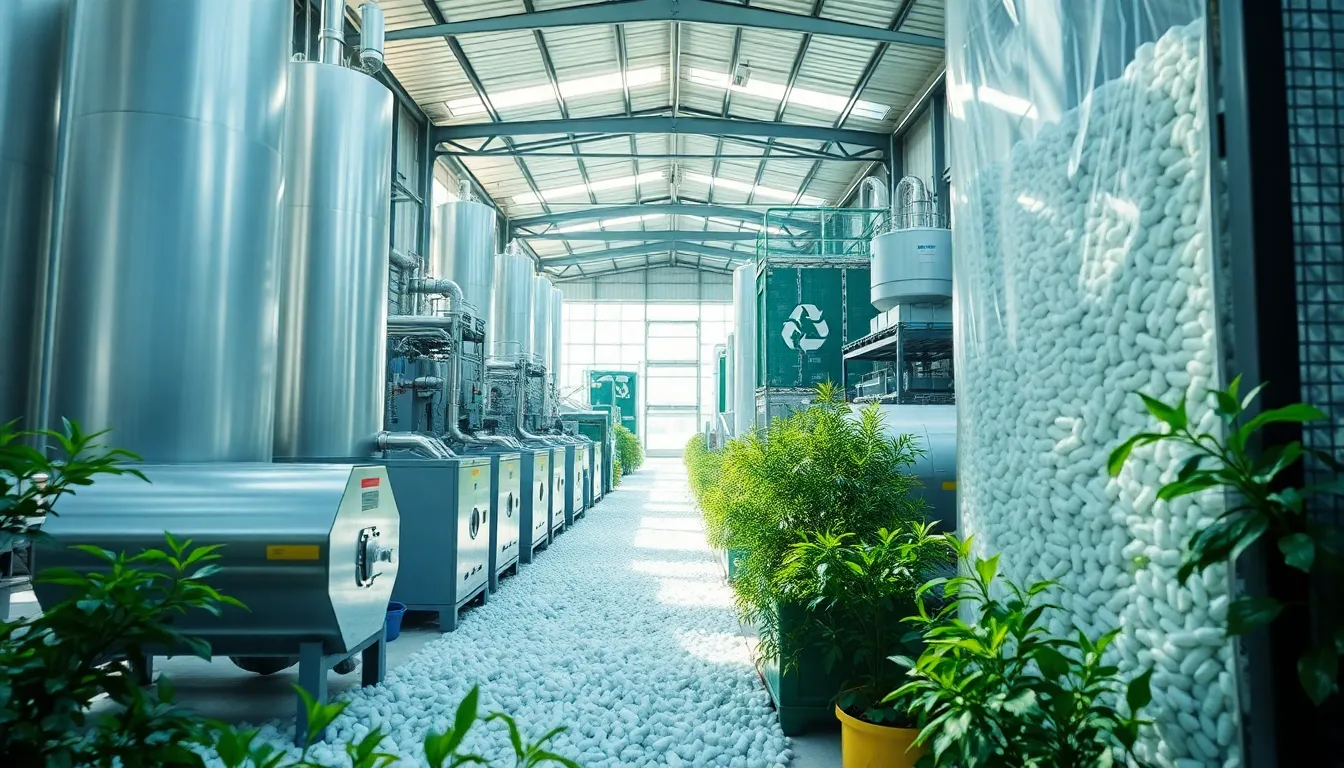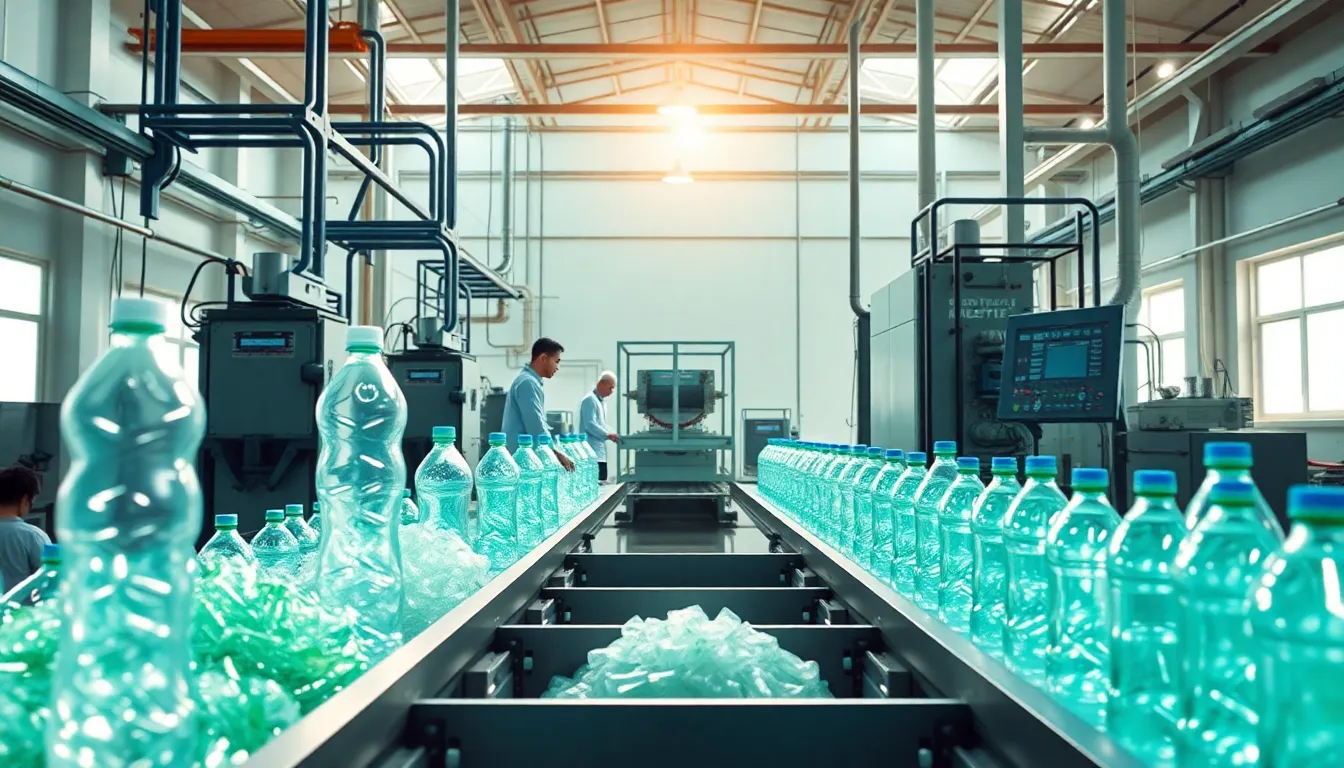A pivotal RM150 million green financing initiative from HSBC funds recycled PET production expansion in Malaysia, marking a significant leap for the nation’s circular economy. This investment is set to establish a 50,000 metric tons annual rPET production capacity in Melaka, transforming waste into valuable, high-quality materials.
Key Implications:
- Boosted Recycling Capacity & Waste Diversion: The RM150 million investment enables a substantial 50,000 metric tons annual production capacity of high-quality, food-grade rPET. This critically diverts significant post-consumer plastic waste from landfills and incineration, transforming it into new resources and reducing reliance on virgin plastics.
- Advancement of Circular Economy & Green Manufacturing: The funding establishes an innovative “bottle-to-bottle” system for processing locally sourced waste, directly supporting Malaysia’s transition to a low-carbon, circular economy. This also reinforces Melaka’s vision as a green state economy hub and positions Malaysia as a regional leader in sustainable materials production.
- Strategic Green Financing & Economic Development: HSBC’s green and sustainability-linked financing model strategically incentivizes recipients to meet predefined environmental targets, effectively driving capital towards sustainable development. This project fosters local economic growth by creating skilled employment opportunities and strengthening Malaysia’s green manufacturing sector.

RM150 Million Green Financing Fuels 50,000 Metric Tons Annual rPET Production
A significant financial commitment from HSBC Malaysia is poised to revolutionize the recycled plastics sector. The bank has committed RM150 million (US$35.5 million) in green and sustainability-linked financing to FE Green PET. This substantial funding enables a critical expansion in Melaka. The project will achieve an annual production capacity of 50,000 metric tons of recycled PET (rPET). This initiative clearly demonstrates how HSBC funds recycled PET production expansion in Malaysia, fostering a more sustainable industrial landscape and supporting the country’s circular economy goals.
Recycled PET, or rPET, refers to polyethylene terephthalate derived from post-consumer plastic materials. This process significantly reduces the need for virgin plastic production. It also lowers carbon emissions associated with manufacturing new plastics. The investment by HSBC Malaysia provides critical capital. This enables FE Green PET to scale its operations and meet growing market demand for sustainable products.
The Strategic Green Financing Initiative
The RM150 million financing package is specifically structured as green and sustainability-linked. This type of funding encourages recipients to meet predefined environmental targets. HSBC Malaysia’s commitment underscores its dedication to supporting environmentally responsible projects. Such initiatives are crucial for transitioning towards a low-carbon economy. This partnership exemplifies how financial institutions can drive positive environmental change through strategic investments.
Sustainability-linked financing involves financial incentives tied to environmental, social, and governance (ESG) performance metrics. FE Green PET will likely adhere to stringent sustainability key performance indicators. Achieving these metrics can result in more favorable financing terms. This structure motivates companies to enhance their environmental stewardship. It ensures funds contribute to measurable sustainability outcomes.
HSBC’s provision of green financing is a testament to its broader environmental strategy. The bank prioritizes sectors contributing to sustainable development. This includes renewable energy, sustainable agriculture, and waste management. Its support for FE Green PET aligns perfectly with these objectives. This partnership accelerates Malaysia’s progress in sustainable manufacturing practices, setting a precedent for future green investments across the region. It highlights how effectively HSBC funds recycled PET production expansion in Malaysia.
Boosting Recycled PET Production Capacity
The projected annual production of 50,000 metric tons of rPET represents a significant leap for Malaysia’s recycling infrastructure. This volume will divert a substantial amount of plastic waste from landfills and incinerators. It will instead transform it into valuable raw material. The new facility in Melaka is strategically located, providing excellent logistical access for both raw material collection and product distribution.
The process of producing rPET from post-consumer plastic materials is comprehensive. It typically involves several key stages. These include meticulous sorting, thorough washing, and grinding the plastics into flakes. These flakes are then melted down and extruded into new pellets. These pellets form the rPET resin, suitable for various applications, including new bottles, food packaging, and fibers.
This expansion by FE Green PET directly addresses the increasing corporate and consumer demand for sustainable packaging solutions. Brands are actively seeking to incorporate more recycled content, reducing their environmental footprint. The availability of high-quality rPET at this scale is therefore critical. It supports numerous industries in achieving their sustainability goals.
Furthermore, the establishment of this major rPET production plant in Melaka brings economic benefits. It creates skilled employment opportunities within the local community. It also strengthens Malaysia’s position as a regional leader in green manufacturing. The focus on value-added recycling helps to build a more resilient and environmentally conscious economy. This underscores the positive impact when HSBC funds recycled PET production expansion in Malaysia.
Investment in Infrastructure and Technology
The RM150 million financing is specifically allocated for critical infrastructure development. A significant portion targets industrial land acquisition. Securing the appropriate site is fundamental for a large-scale manufacturing operation. This ensures adequate space for production lines, storage, and logistical operations. The chosen location in Melaka facilitates efficient supply chain management.
Another crucial allocation of the funds is for state-of-the-art rPET production equipment. Modern recycling machinery is essential for high efficiency and product purity. Advanced equipment ensures the removal of contaminants. It also guarantees consistent quality of the recycled resin. This high standard of rPET is vital for acceptance in demanding applications like food-grade packaging.
The financial commitment from HSBC Malaysia directly supports FE Green PET’s expansion. This funding will facilitate the entire construction phase of the new plant. This includes site preparation and building the necessary facilities. Investment in advanced technology enhances the competitiveness of Malaysia’s recycling industry. It ensures the production of world-class recycled materials.
This strategic investment facilitates the expansion of rPET resin production. The resin is entirely derived from post-consumer plastic materials. This approach contributes significantly to closing the loop in plastic consumption. It transforms waste into valuable resources. This focus on sustainable production methods positions FE Green PET as a key player in the circular economy. The successful implementation of this project underscores the transformative power of targeted green financing. HSBC’s continued support will be pivotal in driving Malaysia’s green industrial growth.

Malaysia’s Circular Economy Gains with Food-Grade rPET “Bottle-to-Bottle” System
A significant investment by FE Green PET and HSBC Malaysia is accelerating Malaysia’s green transition. This initiative directly advances circular economy goals. It implements a revolutionary bottle-to-bottle system that transforms locally sourced waste into high-quality, food-grade rPET. This expansion, driven by HSBC funds recycled PET production expansion in Malaysia, marks a critical step towards sustainable resource management.
Innovating Waste Transformation: The “Bottle-to-Bottle” Process
At its core, the project establishes a robust “bottle-to-bottle” circular system. This innovative approach efficiently converts post-consumer plastic materials into recycled polyethylene terephthalate (rPET). This system prevents plastic waste from accumulating in landfills. It also reduces reliance on virgin plastic production, conserving valuable natural resources. The process creates a closed-loop cycle, maximizing material utility.
The transformation involves a precise, multi-stage operation. It specifically includes the critical steps of sorting, cleaning, decontamination, and pelletizing of locally sourced PET bottles. This rigorous process ensures the output is a high-quality, food-grade rPET resin. This resin meets stringent safety and quality standards, making it suitable for new food and beverage packaging. Achieving food-grade certification is essential for broad market acceptance and consumer safety.
Utilizing locally sourced PET bottles offers numerous benefits. It minimizes transportation distances and associated carbon emissions. This approach also strengthens local waste collection and recycling infrastructure. The plant’s operations directly contribute to significant waste reduction and sustainable practices. This strongly supports Malaysia’s overarching environmental policies and economic strategies. The HSBC funds recycled PET production expansion in Malaysia showcases a commitment to responsible industrial growth.
Strategic Development and Regulatory Framework
This forward-thinking project aligns seamlessly with regional development strategies. It is a key component of Melaka’s Industrial Booster initiative. The initiative actively promotes industrial growth while upholding environmental stewardship. This particular investment powerfully reinforces Melaka’s vision to become a green state economy hub. It demonstrates a tangible commitment to sustainable development.
The project also operates within Malaysia’s evolving regulatory environment. Earlier this year, the Federal Government introduced tightened regulations. These new rules require approval from a government-owned certification body for all scrap plastic imports. This measure ensures quality control for incoming materials. It also prioritizes the processing of domestic waste, fostering a self-sufficient circular economy within the nation. The regulatory framework supports legitimate, high-standard recycling operations.
Furthermore, this initiative extends beyond national borders, connecting regional and global supply chains. It facilitates low-carbon development by supplying high-quality rPET to manufacturers worldwide. This positions Malaysia as a vital player in the global market for sustainable materials. The effort contributes significantly to international efforts in reducing overall carbon footprints. It highlights Malaysia’s growing leadership in green manufacturing practices.
The HSBC funds recycled PET production expansion in Malaysia represents a monumental stride. It underscores a national commitment to sustainability, resource efficiency, and economic resilience. This investment not only transforms waste but also drives broader environmental and economic benefits. It sets a new benchmark for green industrial developments across the region.
Featured image generated using Flux AI
PackagingInsights: “HSBC funds recycled PET production expansion in Malaysia”
